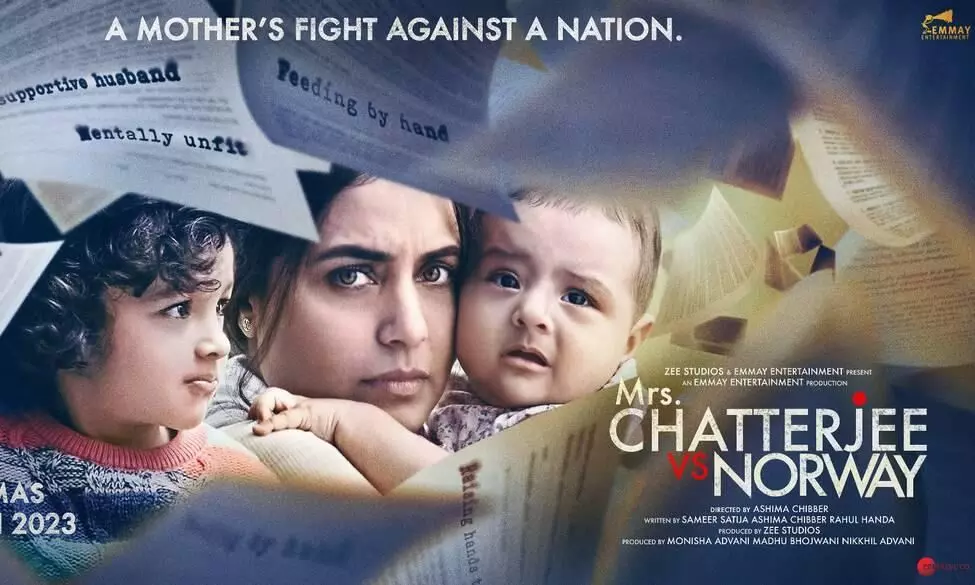
‘Mrs Chatterjee vs Norway’ not an attack on country, but a call to reconsider child protection system: Mani Shankar Aiyar to Norway’s Ambassador
text_fieldsThe movie Mrs Chatterjee vs Norway has been in the headlines for the past few days.
Directed by Ashima Chibber, it has actress Rani Mukherjee playing the lead protagonist and follows an Indian immigrant mother's fight against an entire nation to regain custody of her children.
The film is based on the autobiography of Sagarika Chakraborty, ‘The Journey of a Mother’. Chakraborty’s children were taken away by the Norwegian Childcare system in 2011 after branding her unfit to take care of children.
Hours after the film hit the screens in India, the Norwegian Ambassador to India, Hans Jacob Frydenlund claimed that the film incorrectly depicts the country's belief in family life.
‘It incorrectly depicts Norway's belief in family life and our respect for different cultures. Child welfare is a matter of great responsibility, never motivated by payments or profit. #Norwaycares.’, he tweeted sharing his article.
Frydenlund said that the film has "factual inaccuracies" and the story is a "fictional representation of the case.’
‘There has been a lot of attention towards the film, Mrs Chatterjee vs Norway. The film is a work of fiction, even though it is based on an actual case. The case being referred to was resolved a decade ago in cooperation with Indian authorities and with the agreement of all parties involved," Norway's Embassy in India said in a statement.
Frydenlund said that to protect the children and the right to privacy the government cannot comment on specific cases due to strict confidentiality regulations. However, some general facts must be set right.
‘Children will never be taken away from their families based on cultural differences described. Eating with their hands or having children sleep in bed with their parents are not considered practices harmful to children and are not uncommon in Norway, irrespective of cultural background,’ he said.
He also said that in the film cultural differences have been shown as the primary factor in the case, which is ‘completely false’ and also denied that "feeding with hands and sleeping in the same bed would be the reason for placing in alternative care."
Now, former union Minister Mani Shankar Aiyar has responded to Norway’s ambassador in his op-ed in The Indian Express, stating that the movie was ‘not a generalised attack on his country’ and deals with a specific real-life case of an Indian immigrant mother’s struggles.
Aiyar stated that the film points to ‘systemic deficiencies that need urgent rectification’. He wrote that the Indian authorities intervened only after the real case was taken up by an Indian MP (Brinda Karat) and the Indian lawyer and that there is ‘no other intervention on record’ to suggest that this is ‘standard practice for the Indian foreign office’.
Aiyar said that there was a need of legislation in India that would compel the Indian government to engage with the child protection services in the West that routinely ‘take away Indian infants on flimsy pretexts’.
Sagarika Chakraborty was told by an English social worker in Stavanger, Norway that Indians were “barbarians” who “ran around naked” until the British civilised them, and that she knew how Indian families treated their children as she had seen Slumdog Millionaire, writes Aiyar adding that he had ‘beautiful memories of the time’ his children were growing up which included ‘feeding them with my hands’.
Scientific studies in Norway and other western countries have established conclusively that children in foster care suffer psychological issues on a scale far larger than is the case of children brought up by their families, Aiyar writes.
‘I suggest the Ambassador draw the attention of his authorities to these studies as he is quite right in asserting that “a mother’s love in Norway is no different from a mother’s love in India”, he stated.
He says that the flaws in the implementation of child protection laws and the laws impact both Norwegian parents and Non-Resident Indian parents.
While the Norwegian ambassador describes the film as fiction, Aiyar writes that it is ‘based on an autobiography penned by the mother who underwent the traumatic experience’.
We need an honest dialogue with western powers on this burning human rights issue, not self-serving defences of the “official Norwegian perspective”, writes the former Minister.












